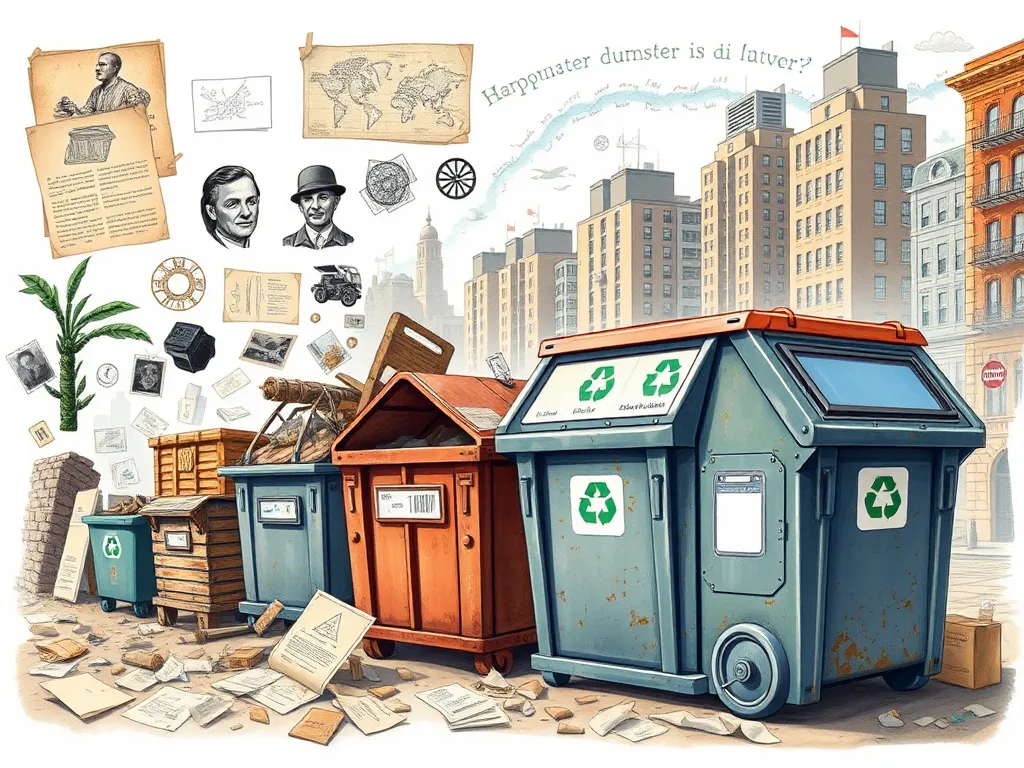A Deep Dive into Dumpster Rental History: From Past to Present

The Comprehensive History of Dumpster Rental
The term 'Dumpster' has become synonymous with waste disposal, but the history of dumpster rental is a fascinating journey that reflects changes in society's approach to waste management. The origins of dumpster rental can be traced back to the early 20th century, with significant innovations and adaptations over the decades. Understanding dumpster rental history allows us to appreciate how this essential service has evolved in response to urbanization, industrialization, and increased environmental awareness.
The transformation of dumpster rental mirrors the broader history of waste management practices. As cities grew and populations swelled, the challenges of waste disposal intensified. The early days of dumpster rental were marked by creativity in design and function, leading to the modern systems we rely on today. There was a significant increase in dumpster use following World War II, driven by housing booms and construction needs, showcasing how external factors can shape waste management solutions.
As we moved into the late 20th and early 21st centuries, the dumpster rental industry became more complex, incorporating technology and sustainability practices into its operations. The proliferation of rental companies, different sizes of dumpsters available, and the digitalization of booking processes represent just a few changes. Understanding the history of dumpster rental reveals how we have adapted our disposal methods in response to both consumer demand and environmental concerns.
Today, dumpster rental is an essential service used by homeowners, contractors, and businesses alike. The industry continues to evolve, focusing on sustainable practices, regulatory compliance, and economic impacts. An in-depth look at dumpster rental history not only highlights advancements in waste management but also invites discussions about our collective responsibility towards waste reduction and recycling.
Overall, the history of dumpster rental encapsulates a journey from simple waste containment to a pivotal role in modern waste management strategies. Learning from this history is crucial for future innovations and responsible practices in waste disposal and recycling.
Origins of Dumpster Rental
The dumpster was invented in the 1930s by a man named George Dempster, a hauling contractor in Chattanooga, Tennessee. Dempster came up with the unique design of a steel container that could be easily dumped into a garbage truck, which later garnered the name 'dumpster'—a fusion of Dempster's name and the word 'dump.' This innovation represented a major leap in efficiency for waste disposal and set the groundwork for the dumpster rental industry.
Effective waste management strategies often rely on a well-placed Dumpster to maximize efficiency and reduce clutter.
Early dumpsters were primarily rectangular boxes designed primarily for the commercial sector. Initially, dumpsters were used to collect waste from construction sites and industrial operations. These first iterations of dumpsters were rudimentary, yet they paved the way for more sophisticated designs that serve a wide variety of needs today, such as residential, commercial, and construction waste collection.
The aftermath of World War II marked a pivotal moment in waste management practices. As the economy boomed and rapid urban development accelerated, the demand for effective waste disposal surged. The government and private companies began investing heavily in organized waste management systems, which included the wider adoption of dumpsters and the emergence of dumpster rental services to streamline waste collection in urban areas.
Evolution Over the Decades
Throughout the decades, dumpster design evolved significantly to address varying waste disposal needs and constraints. The late 20th century saw the introduction of different sizes and weights of dumpsters, allowing for more tailored solutions for businesses and residential users. This diversification in dumpster types has made it easier for companies and individuals to find the right solution for their waste disposal needs.
As dumpster rental became more prevalent, regulatory developments began shaping the industry. Governments enacted stricter waste disposal regulations and sustainability initiatives, compelling dumpster rental companies to comply with new guidelines. This included enhancing tracking methods, adhering to recycling protocols, and ensuring safety standards were met to protect workers and the environment.
Moreover, the integration of dumpsters into urban development has transformed landscapes and waste management strategies. As cities modernized and expanded, dumpsters became essential in managing waste effectively. The growth of rental services has influenced policies on waste management, making it a vital aspect of city planning and environmental management efforts.
Modern Dumpster Rental Practices
Currently, a variety of dumpster types are available for rent, ranging from small containers suitable for home cleanouts to larger units designed for construction projects. These options provide flexibility for users, making it easier to choose appropriate dumpsters based on specific needs. Additionally, companies often offer front-load, roll-off, and specialized dumpsters for various waste types, contributing to efficient waste management.
Technology has played a significant role in changing dumpster rentals. Online booking, GPS tracking for delivery, and mobile apps have streamlined the process, enhancing customer experience. Rental companies can now optimize their operations with software that manages inventory, trends in waste generation, and efficient routing for pickup and delivery.
Sustainability practices have also gained prominence in modern dumpster rental. Many companies now emphasize recycling and waste reduction, providing customers with guidelines on separating recyclables and reducing landfill waste. Such commitments are crucial as more individuals and businesses prioritize environmentally responsible waste management solutions in today's conscious society.
Economic Impact of Dumpster Rentals
The dumpster rental industry has seen significant growth over the years, fueled by increasing waste generation and the rise of construction and renovation projects. As a result, the market has expanded to accommodate a wider range of clients, from homeowners to large corporations. This growth is indicative of shifting perceptions around waste management and consumption practices.
Economic benefits derived from dumpster rental extend beyond direct revenue. The industry has led to job creation across various sectors, including transportation, logistics, recycling, and waste management services. By employing a diverse workforce, dumpster rental companies contribute to local economies and create job opportunities in a rapidly evolving market.
However, cost factors can vary widely within the dumpster rental industry, influenced by geographic location, type of waste, and disposal fees. Understanding the economic dynamics and costs associated with dumpster rental is crucial for users to make informed decisions about waste disposal that align with their budget and project needs.
Cultural Perceptions of Dumpster Rentals
In popular culture, dumpsters often have a mixed perception. Often depicted in movies and television shows, they can be associated with humor or even as places of hidden treasure. This cultural portrayal reflects larger societal attitudes towards waste and consumption, encapsulating both fun and seriousness surrounding waste disposal.
On the other hand, dumpster diving—a practice where individuals search through dumpsters for discarded but usable items—has its own set of stigmas. While some view it as resourceful and eco-friendly, others see it as socially unacceptable, showcasing the complexity of cultural attitudes toward waste.
Despite the stigma, community involvement and awareness surrounding waste management have swelled in recent years, promoting dumpster rental as an effective solution to waste disposal. Increased conversations on sustainability and environmental responsibility have led to heightened community interest in responsible waste reduction, recycling efforts, and education on waste management practices.
